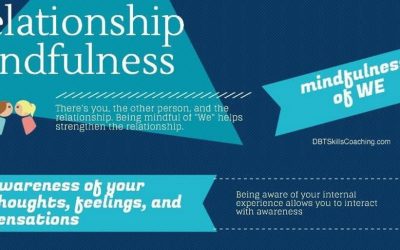In DBT, there are three basic goals in interpersonal interactions. One goal is getting an objective met (Objectives Effectiveness), one is maintaining a relationship (Relationship Effectiveness) and another is maintaining your self-respect (Self-Respect Effectiveness).
If you want your car repaired, you focus on objective effectiveness. You’re not really interested in maintaining a relationship with the mechanic and your self respect is not the top priority.
If you have a good friend who hasn’t returned the lawn mower he borrowed, your priority would likely be to maintain the relationship, though you’d also like your lawn mower back. That would be relationship effectiveness as the top priority.
Maintaining self-respect includes standing up for what you believe in. This objective is the priority when the simple act of standing up and speaking is most important. Self-respect effectiveness is the priority when getting what you want and maintaining relationships are not as important as asserting yourself, such as expressing an opinion, asking for something, or saying no.
It’s great when you can maintain self-respect, get your objective met, and maintain your relationship. But that is not the case in many situations. You can’t always get what you want and maintain relationships. You can’t always maintain relationships and keep your self respect. Being aware of the priority that you are choosing and making it wisely is important for the way you feel about yourself.
For example, maybe you’ve been invited to a get together. Someone you know who has been a part of the same group wasn’t invited because he has different political beliefs than the rest of you. You decide that leaving the friend out because of his political opinion is against your values. You want to go to the party and standing up means you may be uninvited and even lose friends. You may also not be effective in changing others minds or in your friend being included (objective effectiveness). You decide your self-respect is most important, so you stand up and speak your opinion. You may also decide not to attend the party in support of the friend who was left out.
Self-respect effectiveness is about maintaining your morals, beliefs and values. It means acting in ways that give you a sense of competency and mastery. Dr. Linehan says the key question to ask yourself is, “How do I want to feel about myself after the interaction is over (whether or not I get the results or changes I want)?”
Self-respect cannot always be the priority. Sometimes it isn’t effective to speak up, such as when speaking up would cost you long term important goals or endanger your safety. In some situations, speaking up about your opinion could risk a job that you need. In rare situations, it could be dangerous to speak up and not effective to speak up.
When you have interactions with others, keep in mind what your primary objective is. If self-respect is the primary objective, then use the skill FAST (see the video on FAST on the website).
F stands for being Fair. Be fair to yourself and to others. Behave in ways that you are proud of yourself in the long run. Don’t take advantage and don’t always give in to others. Validate your own point of view and the point of view of others.
A stands for no unnecessary apologies, Don’t over-apologize. Don’t apologize for having an opinion, for existing, for making a request, or disagreeing. When you over-apologize, you decrease your sense of competence and self-mastery.
S stands for Stick to your values. Don’t sell out your values to get someone to like you. Calmly stick to what is important to you.
T is for being Truthful. Don’t lie or act helpless when you are not. A pattern of dishonesty over time erodes your self-respect.
Live a skill-full life





0 Comments